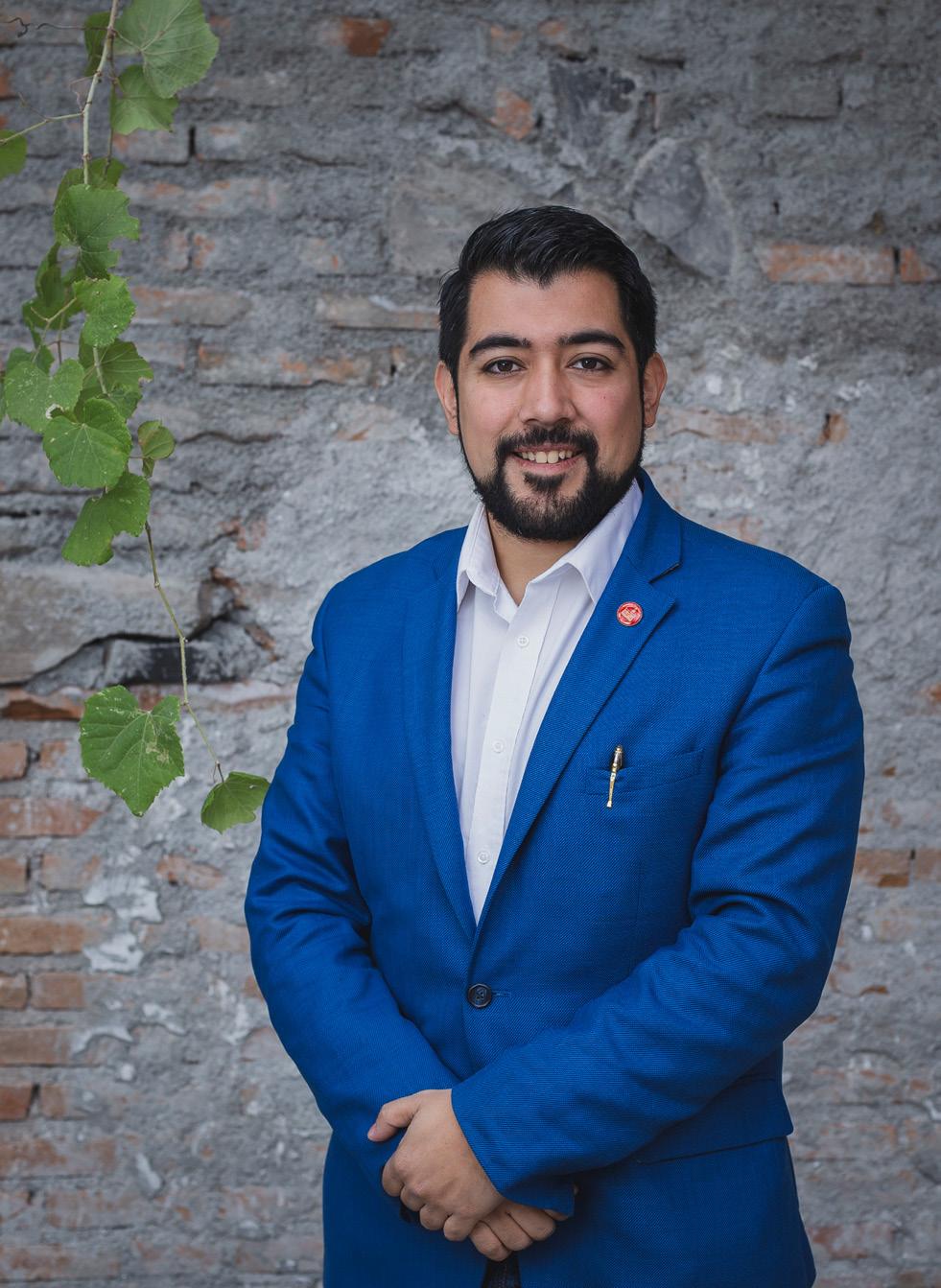
7 minute read
Somm Perspectives
It’s fine to me... is it fine to you?
Manuel Negrete is the Wine Director at Wine Bar by Concours Mondial de Bruxelles. Originally from Mexico City, he obtained the title of sommelier at the tender age of 21. After working on the agent side, and joining ASI’s marketing team in 2019, he joined the Wine Bar by Concours Mondial de Bruxelles team as Wine Director, in 2020. He represented Mexico at the ASI Best Sommelier of the Americas Competition in 2022, is a contributor to Reforma Newspaper, an ambassador to Star Wine List and a judge at the Concours Mondial de Bruxelles.
Lê Hoàng Khánh Vi is a passionate sommelier, the founder of NOB Natural Wine Bar, and currently Vice-President of Vietnam’s Saigon Sommelier Association (SSA), owns a Master's degree in Wine Tourism. The diploma is awarded by three prestigious universities in Europe including the University of Bordeaux (France), University of Porto (Portugal) and University of Rovira I Virgili (Spain).
ASI: What is your definition of fine wine?
Lê Hoàng Khánh Vi (LHKV): For me, “fine wine” equates to a wine of purity... a wine that is taken care of from the vineyard through the winemaking. The wine would show respect to nature, offer authentic characteristics of the terroir where the wine comes from and typicity. The flavour and taste of this wine should also show beautiful structure, texture, depth, and length.
Manuel Negrete (MN): I classify fine wines in two categories: the first are those that due to their historical fame become part of the sommelier's bucket list, those that you must try at least once in your life, and which are usually icons of the production area they represent, having behind them the weight of several decades and sometimes centuries of prestige.
The other category is all that wine that exceeds expectations, that not only fulfills what the information on the label promises, but the one that can sincerely surprise you and that in many occasions, you feel that you have paid less money than what the quality of the product has given you.
ASI: Historically we have associated ‘fine wine’ with wines from specific, notable wine regions such as Burgundy, Bordeaux, Mosel etc. Do you think this connection to place is still relevant or has the definition of fine wine as it connects to places changed as the wine landscaped has broadened?
LHKV: To me, the connection to place of ‘fine wine’ is still relevant as wines are made from grapes; therefore, ‘fine wine’ should connect to the place the grapes grow and express the terroir, landscape of its origin. However, the place is broadening and is not just limited to several regions as the world of wine is continuously moving and changing. We can't stick our mind into some historical regions as mentioned, we should be open to think about other areas, even small, new wine regions such as Mallorca, Sicily, New York State, Ningxia, Yamanashi, and others.
MN: Of course, it still has a lot to do with it and there are several examples of labels that will never lose being named the object of desire. However, I have found really amazing labels in countries less associated with such icons, such as incredible rosés from Moldova, delicate and very complex Koshu in Japan, as well as a super Crémant from Wallonia in Belgium, to name a few. I think that on many occasions, fine wine is related to red wines, and lately I have had more and better surprises with whites and rosés.
ASI: Is how the vines are managed relevant to your definition of fine wine?
LHKV: Definitely yes, the way vines are managed are absolutely relevant to what I think is ‘fine wine’. For me, a ‘fine wine’ is a wine of purity that reflects a taste of its terroir.
Applying organic, biodynamic or sustainable farming methods preserves the soil quality, environment, et cetera. When grapes are grown in natural conditions the expected return is typicity, a taste of terroir reflective of the vine’s origin.
Moreover, with the global warming, the ways of cultivating and making wines are crucial to consider about the planet. We need to reduce chemical additions, replacing them by other environment friendly practices. Organic, biodynamic, and sustainable methods should be encouraged everywhere.
MN: Yes and no, because clearly, we must be grateful for the extra effort that the producer puts into providing a wine that is much more loyal to the area from which it comes. However, there are many wines that are produced in areas where it is not so easy to utilise organic or biodynamic practices simply because of the type of climate they have and I do not think that this detracts from the opportunity to produce spectacular wines, simply because the buyer will not see a label that it is an organic wine or has a Demeter emblem on the back label.
I have always said, I like wine; if the producer is biodynamic, minimal intervention, organic or none of the above, as long as the final product is good, I will be able to recommend it. The only thing that bothers me is that suddenly they want to sell and aspire or glorify producers who have a clear hygiene problem in their winery, and they want to sell it to me as "natural wine is like that".

On the other hand, there are producers who make their wine with practices considered organic and even biodynamic and never declare it, because they do not even mind paying for the certification and those who buy their wines (me included) know them for making spectacular wines.
ASI: Can a wine be fine if made using conventional methods? Or in large volumes?
HKV: Undoubtedly winemaking is extremely important for the final result as unsuitable decisions can destroy even very high-quality grapes. Growing vines using organic, biodynamic methods and making wine using natural or conventional methods is the choice of the winemaker based on various factors that differentiate among other wineries. We cannot easily conclude: this method can be surely made ‘fine wine’ and that method is certainly not without specific information; however, the conventional method in general may contain more chemical additives than other methods and for that it is supposed to not keep the original flavor and taste of the grape and the terroir as “fine wine” is expected to be. In order to have ‘fine wine’ there needs to be a lot of effort both in the vineyard and the winemaking. As such it would be hard to take care of every step and paying attention to the very details required to ensure a wine of such quality. For these reasons, I would say it is possible but it would be truly difficult to make ‘fine wine’ in large volumes.
MN: Yes, of course, good wine is born in the vineyard, but extraordinary wine is the product of knowing how to do the best with that spectacular fruit, and extracting the best of its essence, providing the final touches in the cellar so that the consumer feels that he or she is drinking a true work of art. In terms of volume, it depends on what you call high volumes, however I believe the ability to create the finest wines depends on the location the grape comes from, whether it is an entire hill, or several hills, whether the best expression comes from one single plot, or if you are creating it from the mixture of grapes that come from different locations and the result is wonderful. It's hard to say. Romanée Conti is created from a plot smaller than 2 hectares, Chateau Lafite comes from a vineyard bigger than 100 hectares, the Scharzhofberger vineyard is almost 30 hectares, so, it depends.






